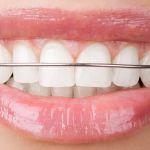How to Manage a Chipped Tooth in an Emergency
- 1. Initial Response to a Chipped Tooth
- 2. First-Aid Tips for Chipped Teeth
- 3. What to Avoid After Chipping Your Tooth
- 4. Long-Term Solutions for a Chipped Tooth
- 5. How to Choose the Right Dental Care
- 6. Real-Life Story of Chipped Tooth Recovery
1. Initial Response to a Chipped Tooth
When you chip a tooth, it’s important to remain calm and assess the damage. The first thing you should do is check the extent of the chip. If the chip is small and doesn't affect your ability to chew, you might be able to wait until you can see a dentist. However, if the chip is large or painful, it’s important to seek medical attention as soon as possible. You can rinse your mouth with warm water to clean the affected area, and applying a cold compress can help reduce any swelling or pain.
2. First-Aid Tips for Chipped Teeth
If you find yourself in a situation where you’ve chipped a tooth, follow these first-aid steps immediately:
- Rinse your mouth gently with warm water.
- If there is any bleeding, apply gauze or a clean cloth to the area until it stops.
- Use a cold compress on your face to reduce swelling.
- Keep any broken pieces of the tooth, as your dentist may be able to reattach them.
These first-aid measures will help prevent further injury until you can get to a dentist. It’s important not to use over-the-counter painkillers excessively, as they can sometimes mask more serious damage.
3. What to Avoid After Chipping Your Tooth
After chipping a tooth, there are certain things you should avoid to prevent worsening the damage:
- Avoid chewing on the side of the chipped tooth.
- Do not try to fix the chip yourself using any household materials like glue or wax.
- Refrain from eating hard or chewy foods that can further damage the tooth.
- Stay away from hot or cold beverages if you experience sensitivity.
By taking these precautions, you minimize the risk of further harm and keep the situation under control while awaiting professional treatment.
4. Long-Term Solutions for a Chipped Tooth
Once you see a dentist, they will assess the severity of the chip and determine the best course of action. Common solutions for chipped teeth include:
- Bonding: A quick and effective way to restore the tooth's shape using a tooth-colored resin.
- Veneers: Thin shells of porcelain placed over the front of the tooth to restore both function and aesthetics.
- Dental Crowns: Used for larger chips, crowns cover the entire tooth, providing both strength and protection.
- Root Canal: If the chip affects the tooth’s pulp or causes infection, a root canal may be necessary.
Each treatment option depends on the location, severity, and type of chip, as well as your overall dental health.
5. How to Choose the Right Dental Care
When selecting a dentist to handle your chipped tooth, consider factors such as:
- Experience with restorative dentistry procedures.
- Availability of emergency care if needed.
- Reputation and reviews from previous patients.
- Comfort level with the clinic and staff.
Choosing the right dentist is crucial for a successful recovery, and finding one with expertise in emergency dental care can provide peace of mind during stressful situations.
6. Real-Life Story of Chipped Tooth Recovery
Take the story of John, a recent case where a small accident led to a chipped tooth. While playing basketball, John took an accidental hit to the face, chipping a front tooth. Initially, he was worried it would affect his appearance and his confidence. After following proper first-aid steps, he saw his dentist, who recommended dental bonding. The procedure was quick, painless, and affordable, restoring his tooth to its original state. John is now fully recovered and continues with his daily activities without worrying about his tooth.
John’s case highlights the importance of acting quickly and seeking professional care after chipping a tooth. It also illustrates how modern dentistry offers a variety of solutions for both functional and aesthetic concerns.
Understanding how to manage a chipped tooth in an emergency is essential to minimizing discomfort and damage. By following first-aid measures, avoiding further harm, and seeking professional dental care, you can recover quickly and safely. If you’re looking for professional dental services, visit Dentistry Toothtruth to learn more about the best treatments available for your chipped tooth.







 Bell Road Family Dentistry - Montgomery4.0 (240 review)
Bell Road Family Dentistry - Montgomery4.0 (240 review) Ernstberger Orthodontics5.0 (326 review)
Ernstberger Orthodontics5.0 (326 review) Scott Silverman, MD3.0 (6 review)
Scott Silverman, MD3.0 (6 review) West Jordan Modern Dentistry and Orthodontics4.0 (222 review)
West Jordan Modern Dentistry and Orthodontics4.0 (222 review) Harbor Care Health and Wellness Center4.0 (154 review)
Harbor Care Health and Wellness Center4.0 (154 review) Evergreen Park Dental4.0 (23 review)
Evergreen Park Dental4.0 (23 review) The Importance of Oral Health Education During Pregnancy for a Healthy Pregnancy
The Importance of Oral Health Education During Pregnancy for a Healthy Pregnancy Best Tips for Brushing Your Teeth Properly for Healthy Gums: Essential Techniques for Oral Health
Best Tips for Brushing Your Teeth Properly for Healthy Gums: Essential Techniques for Oral Health Why Skipping Dental Checkups Can Lead to Bigger Oral Health Problems
Why Skipping Dental Checkups Can Lead to Bigger Oral Health Problems Advantages of Porcelain Dental Restorations
Advantages of Porcelain Dental Restorations How Can Diabetes Cause Tooth and Gum Problems? Preventing and Managing Oral Health Issues
How Can Diabetes Cause Tooth and Gum Problems? Preventing and Managing Oral Health Issues Healthy Habits for Promoting Good Oral Health and Hygiene: Tips for a Healthy Smile
Healthy Habits for Promoting Good Oral Health and Hygiene: Tips for a Healthy Smile